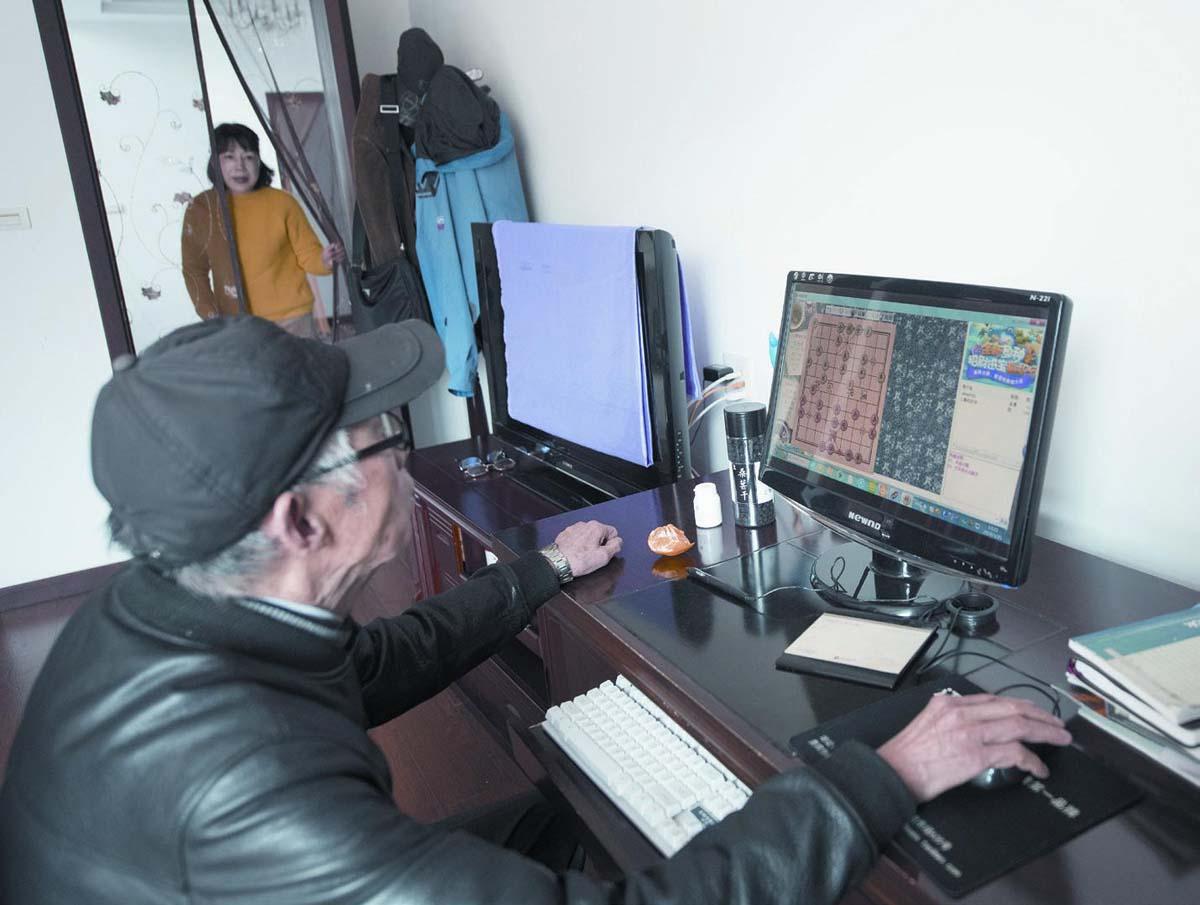Finding a New Friend
2019-09-10ByLiQing
By Li Qing

As a fi nancial director in a private company in Shanghai, Gao Shengyi had a busy career. Now, after retiring, life is busier still. The 68-year-old volunteers to teach other retirees how to crack the mystery of smartphones and apps and when she is not teaching or volunteering, she is traveling. She has been to 50 countries, sharing photos and posts on her travels on social media. In short, Gao exemplifi es how the older generations too are embracing the Internet and new technology to get more out of life.
“People cant use age as an excuse and stay cut-off from social developments and the Internet,” Gao told Beijing Review. It was the Internet that turned her into a confi dent person from the quiet and introverted woman she used to be by increasing her access to information and broadening her horizon, she added.
Gao began to use the computer in 2000. Apart from basic office software, she can also use other popular software programs like Photoshop for imaging and graphic design. Now all her learning experience has become part of a textbook designed by a website to help the technology-shy elderly master technology.
Never too old to learn
Oldkids.cn, a website that is a social platform for the elderly, is trying to spread advanced technology application among the elderly since it was founded in 2001 by Wu Hanzhang, a Shanghaibased social entrepreneur.
“We have 350,000 registered users between the age of 50 and 90, the majority being in the 60-70 age group,” Wu said. Over 30,000 users share their life experiences and feelings on the website, make friends and get information about public welfare activities every week.
According to a survey report on the living conditions of Chinese senior citizens by China Research Center on Aging in 2018, after 2015, more than 12 million seniors are using the Internet. The most popular use of the Internet among them is for checking the news, which accounts for 85 percent of all activities; 65.4 percent of them also like watching movies and TV series online, followed by chatting and trading stocks. The proportion of online shopping is 12.4 percent.
Some trendy apps have also become their happy surfing ground, like Douyin (or TikTok), a popular short video-sharing platform, where many elder surfers are showcasing their life and experiences, modeling fashionable clothes and even telling their love stories.
“They have become role models for the younger generation, showing them how to lead a meaningful and disciplined life, something that can accelerate mutual understanding. It is a good outlet for them to release their emotions and tension, which should be encouraged,” Wu said.
Li Zhixia, a fashionable 58-year-old in Yangzhou, east Chinas Jiangsu Province, is an avid user of WeSing, a popular karaoke app. She has uploaded 180 songs on WeSing, relishing the comments posted by her friends and other netizens. Initially, she embraced the app as she liked singing along and being able to do it anywhere she wanted. She moved to Yangzhou five years ago from Yancheng, another Jiangsu city that is over 200 km away, to take care of her grandchildren. It meant uprooting herself from her old life and leaving friends behind. Or thats what she thought at fi rst.
But through WeSing, an old friends circle has been built while she is also making new friends. “It entertains me, which is a good way to relieve stress,” she said. In the comment section of her homepage on WeSing, Lis friends are always writing about their recent activities and wishes. They also listen to each others songs and send virtual gifts through the app, a new way of keeping in touch. “We usually sing the old songs that were popular when we were young. It reminds us of past days,” Li said.
“Open-minded elderly people like to learn new things out of curiosity,” Wang Dahua, a professor with the School of Psychology of Beijing Normal University, told Beijing Review. The fact that they are learning to use the Internet is a fruit of this era, which has now seen the advent of 5G communication technology, making communication faster, easier and more innovative.
Compared to the situation 20 years ago, seniors today have diverse values and care more about themselves, Wang said. At the same time, the restrictions and requirements imposed on them by society have been reduced.

WeChat, one of the most popular social media platforms in China, is also being used by seniors. In 2017, there were 50 million active elderly users aged between 55 and 70. This group spent 1.37 hours on WeChat on average daily.
“The online interactions can be extended to offl ine activities,” Wu said. Many seniors participating in the same study groups online are ready to organize or take part in outdoor activities for the group. Gao always attends group activities like lectures and book reading sessions with her friends.
Some elderly people are reluctant to learn new things as their ability to learn and their memory are diminishing. But they have to accept the fact that with the rapid development of the Internet, it is hard today to live without it.
Wu explained even those who seem to have no interest in advanced technologies would start to learn when he conducted courses for mobile phone popularization among the elderly. “The significance of groupings should not be ignored as seniors are influenced by their friends, who can play a positive role in their life,” he said.
Remaining in charge
Wang said the number of empty-nest elderly parents, whose children have grown up and left the parental home, is on the rise. Then there are the seniors who have become part of the migrant population for reasons such as moving closer to their adult children. They have to get used to a new environment fi lled with unfamiliar things, languages and a new lifestyle. They need to be given a sense of security and the confi dence that they are still in control of their lives.
“They will experience a huge psychological gap caused by the new life that is so different from the previous one. It will require them to adjust their focus and create new connections to the world,” she said. And this is where the Internet can help immensely.
However, the Internet and social media are not unmixed blessings. There are hidden pitfalls as well and new learners have to be taught to recognize them and to avoid them.
Wu said several tasks should be kept in mind when designing online products such as guarding against fraud.
“To meet the specifi c needs of the elderly, I hope there are apps and software especially designed for them,” he said.
Gao thinks technology empowers the elderly. Seniors should make the decisions for their own life, she said, living healthily and energetically because it will lessen the burden on their children and bring happiness to everyone.
